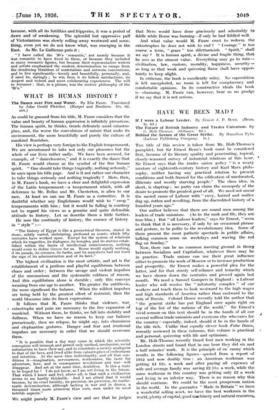WHAT IS HUMAN HISTORY ?
As could be guessed from his title, M. Faure considers that the' Value and beauty of human expression is infinitely precarious.' The human spirit, he thinks, treads delicately amid catastro- phes, and, the worse the convulsions of nature that make its environment, the more beautifully and purely the culture of mankind flourishes.
His view is perhaps very foreign to the English temperament.. We are accustomed to take not only our pleasures but the whole of our lives rather sadly. We have been accused, for example, of " daneelessness," and it is exactly the dance that M. Faure would choose as the symbol of the free human spirit. " One should take things tragically, nothing seriously," be says upon his title page. And is it not rather our character to take things seriously and nothing tragically ? Here, then, in M. Faure's book, we have a clear and delightful expression of the Latin temperament—a temperament which, with all deference to Mr. Belloc and Mr. Chesterton, is alien to our race. At least we can use M. Faure as a corrective. It is doubtful whether any Englishman would wish to " swop " temperaments with him ; but it would be failing in courtesy not to regard his views as a genuine and quite defensible attitude to history. Let us describe them a little further.
He sees the continuity of history, the essence of history in " style " :—
" The History of Egypt is like a geometrical theorem, stated in stone, subtly varied, undulating, profound as music; which fifty centuries have worked upon. Except for the system of relations which its tragedies, its dialogues, its temples, and its statues estab- lished within the limits of intellectual consciousness, nothing would exist to define Greece for us. Rome would signify nothing, if its annals, its circuses, its baths, and its aqueducts had not fixed the sign of its administration and of its laws."
The highest civilization is the most artistic, and art is the establishment of a perilous and playful equilibrium between chaos and order ; between the savage and violent impulses of the unconscious and the systematic coldness of reason. And this equilibrium alone is durable ; only this conveys meaning from one age to another. The greater the antithesis, the more significant the balance. When the wildest impulses are being held by the greatest effort of restraint, then the world blossoms into its finest expressions.
It follows that M. Faure thinks that violence, war
• catastrophe and pain are necessary to the free expansion of mankind. Without them, he thinks, we fall into stolidity and dullness. When we have no reason to keep our balance precariously, then we relapse, he might say, into clumsiness and elephantine gestures. Danger and fear and irrational impulses are necessary in order that we should overcome them.
" It is possible that a day may come in which the scientific conception will triumph and permit only method, mechanism, social automatism to have their say, and to constitute a society analogous to that of the bees, and freed alike from catastrophes of enthusiasm and intuition. At the same time individuality, and all that con- ditions it—imagination, nervousness, restlessness, the taste for adventure, love, and in consequence revolutions and war—will disappear. And art at the same time, doubtless. Is this a state to be hoped for 1 I do not know, as I am not living in the future. That which I .know and feel, above all, is that such a civilization seems to me hardly thinkable. And I am afraid that it would become, by its cruel lucidity, its precision, its prevision, its mathe- matic determination, although lacking in war and in drama, a thousand times more atrocious than ours, seen under its most terrible aspects."
We might parody M. Faure's view and say that he judges that Nero would have done graciously and admirably to fiddle while Rome was burning—if only he had fiddled well.
And what value would M. Faure erect to redeem the catastrophes he does not wish to end ? " Courage " is too coarse a term, " grace " too dilettanteish. " Spirit," shall we say ? It is human spirit, a divine and fragile thing, that he sees as the utmost value. Everything may go to ruin— civilization, law, custom, morality, happiness, security— so long as that weak and quivering flame shall have oppor- tunity to keep alight.
In criticism, the book is excellently witty. No superstition is left unexploded, no room is left for complacency and comfortable opinions. In its constructive ideals the book is—charming. M. Faure can, however, bear us no grudge if we say that it is not serious.










































 Previous page
Previous page